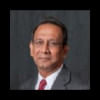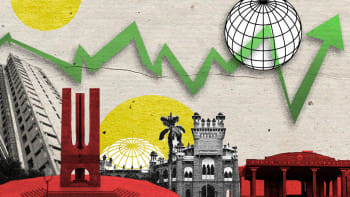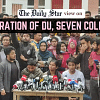What's in a university ranking?

It's an awful time for many universities in Bangladesh, both public and private, that are struggling with their reputation. Over 49,000 students left Bangladesh last year for a whole host of reasons, the biggest being that the local higher education institutions (HEI), with a few exceptions, have either failed or are failing in their teaching and research missions. Focus for most students in the publics is to get into the Bangladesh Civil Service; studying the actual subject they enrolled in comes second. Opening new departments typically benefits teachers and their vote bank. In effect, too many institutions function more like teaching factories, with many of their faculty teaching at other institutions, typically private ones, to make a quick buck. The folks who are busy running between campuses have no time for teaching at either place and, surely, no time for conducting any substantive research.
A large number of our students are leaving for Australia, EU and North America, majority of whom may never return. Others are studying in countries not too far from Bangladesh as a first try. A large majority of them will then seek destinations far away from our immediate neighbourhood, where they will be valued for their academic and technical prowess and not for their political affiliation and connections. Many students of Bangladeshi institutions will find that the programmes are neither rigorous nor have ever been subjected to any real global accrediting bodies. Such students, to their regret, will have little choice but to repeat their degrees yet again overseas.
Ranking data pertaining to Dhaka University, in particular, was documented first in Dhaka University: Can It Turn Around? (BDNews24.com, December 24, 2011). A group of DU's faculty members did a follow-up with the book University of Dhaka: Making, Unmaking, and Remaking. It articulated and hoped "if a generation of humans got involved in making the university and sadly another generation in unmaking it, then surely there is hope that, yet another generation of humans will engage themselves in remaking the university." Unfortunately, those who are driving the HEIs in Bangladesh are more often in denial; a few use universities, typically privates, as cash-cows; and others are either unwilling or unequipped to interpret data and take necessary corrective actions to prevent the downfall.
The ranking matrix of Times Higher Education (THE), which has garnered attention recently, assigns weights to the following major areas: academics (30 percent), research (27.5), citations/faculty (32.5), industrial support (2.5), and internationalisation (7.5). In the latest ranking, one institution from Brunei, 24 from India, 21 from Iran, eight from Pakistan, 11 from Malaysia, 15 from Saudi Arabia, and eight from Turkiye were recognised as Top 800 global HEIs, but not even a single university from Bangladesh, public or private, could be part of that list.
The ranking matrix of Times Higher Education (THE), which has garnered attention recently, assigns weights to the following major areas: academics (30 percent), research (27.5), citations/faculty (32.5), industrial support (2.5), and internationalisation (7.5). In the latest ranking, one institution from Brunei, 24 from India, 21 from Iran, eight from Pakistan, 11 from Malaysia, 15 from Saudi Arabia, and eight from Turkiye were recognised as Top 800 global HEIs, but not even a single university from Bangladesh, public or private, could be part of that list. Four universities – two private and two public, namely Brac University, Dhaka University, Jahangirnagar University (JU) and North South University (NSU) – were ranked between 801 and 1,000.
According to THE data, Bangladeshi universities didn't provide institutional data to THE until the start of 2019. Dhaka University, the country's first university and so-called "Oxford of the East," emerged in the 2020 THE ranking between 1,001 and 1,200. In the 2021 ranking, Bangladesh University of Engineering and Technology (Buet) joined DU in the bracket. Six universities from Bangladesh tried for 2022 THE ranking, and three were successful; DU gained ground and was ranked between 801 and 1,000, and Buet slipped to the 1,201-1,500 bracket. Bangladesh Agricultural University (BAU) was ranked for the first time between 1,001 and 1,200.
Fifteen HEIs from Bangladesh tried for the 2023 ranking. DU did better than the prior year and ranked between 601 and 800, and for the first time, NSU's name appeared as it was placed in the same bracket. A great year for both universities – one public and one private. Unfortunately, we saw BAU losing ground, ranking between 1201 and 1500. Khulna University of Engineering and Technology (Kuet) got in for the first time, and along with BAU and Buet, ranked between 1,201 and 1,500. Twenty-one HEI's participated in the 2024 ranking. Both NSU and DU lost ground, and JU and BracU got in for the first time, with all four ranking between 801 and 1,000. BAU, Buet and Kuet saw no changes.
If the trend shows any hope, it's that each year more Bangladeshi HEIs, to their credit, are trying to be ranked. Also, a lesson learnt is that getting ranked higher will never be easy without rectifying the institutions significantly (in terms of faculty quality and programme strength), as well as sustaining and continually bolstering those changes. The standing of HEIs is determined typically by the prowess of their faculty, as measured by both the quality and quantity of new knowledge generated by them, and the success of their graduates.
If the institutions can have their own professional academic programmes – such as those centring business, engineering, health, and pharmacy – and seek accreditation from real bodies, they can generate better and marketable products both within and outside Bangladesh. For a long time, many in Bangladesh have given the excuse of wanting to become a signatory to the Washington Accord for not seeking accreditation; however, it will be a long-drawn-out process. The current full signatories from our own neighbourhood, not surprisingly, include India, Pakistan, and Sri Lanka. In recent times, we are thinking of a substitute local accrediting body like the Bangladesh Accreditation Council to somehow guarantee quality professional education. However, the BAC is not being able to deliver on quality acceptable outside, and in this context, in my humble opinion, this latest endeavour is going to waste more years from the life of our current universities.
By talking to dozens of private university graduates who went to the US and have become successful citizens of the world, I am certain that we have talents but not the path or process to guarantee their success within Bangladesh. On the bright side, NSU has already succeeded in getting her business programmes accredited by the Accreditation Council for Business School and Programs (ACBSP), which should pave the path for eventual accreditation by the Association to Advance Collegiate Schools of Business (AACSB), the gold standard for business graduates.
Too many of the HEI administrators in Bangladesh don't offer confidence about what it might take to push forward their own institutions. It is concerning when a pro-vice chancellor makes simple statements such as "will be among top 50 global universities if research allocation increased" or when a vice chancellor compares university ranking with cost borne by students when buying tea and snacks. Money alone will not improve research reputation unless and until the institutions overcome the challenge of good governance, and both students and faculty become free from both violence and political dominance. In 2020, out of 46 public universities, 38 spent a total of Tk 72.91 crore in research, while out of 107 private universities, 77 spent TK 111.73 crore for research purposes, according to University Grants Commission. It may not be a coincidence that two private universities, namely BracU and NSU, both known for having recruited relatively strong faculty, continue to lead the pack of private universities in THE ranking.
The HEI leaders must understand, when one is pushing their own institution upward that every other institution in the whole world is also pushing themselves harder. In this race for the top, world-class HEIs are more like Sisyphus having to roll an immense boulder up a steep climb only for it to roll down when they near the top. As can be imagined, the best and most successful institutions, thus, try their best so that they can at least hold on to (if not further improve) their latest rank. Jorge Sabato, the Argentinian physicist who pioneered science and technology policy in Latin America, used to say that "it takes 15 years of hard work to build a world-class research university, but only two years to destroy it."
Mohammad A Karim is professor of electrical and computer engineering at the University of Massachusetts Dartmouth in Massachusetts, US.
Views expressed in this article are the author's own.
Follow The Daily Star Opinion on Facebook for the latest opinions, commentaries and analyses by experts and professionals. To contribute your article or letter to The Daily Star Opinion, see our guidelines for submission.


 For all latest news, follow The Daily Star's Google News channel.
For all latest news, follow The Daily Star's Google News channel. 









Comments